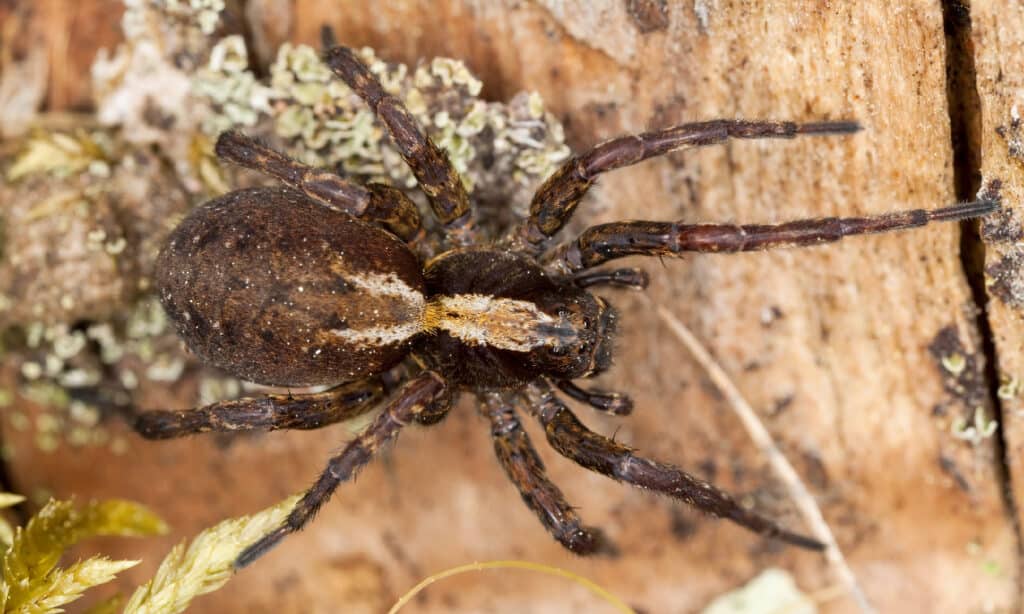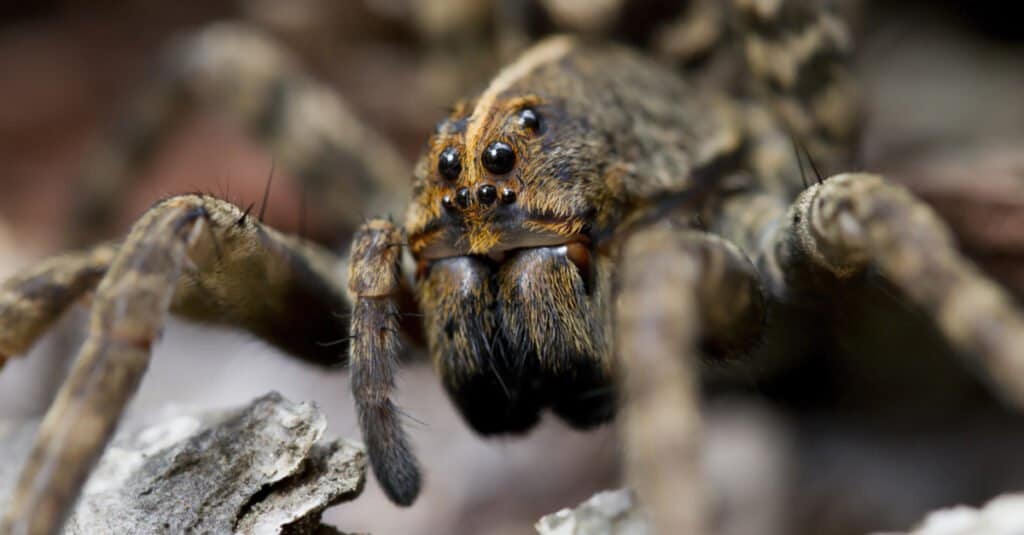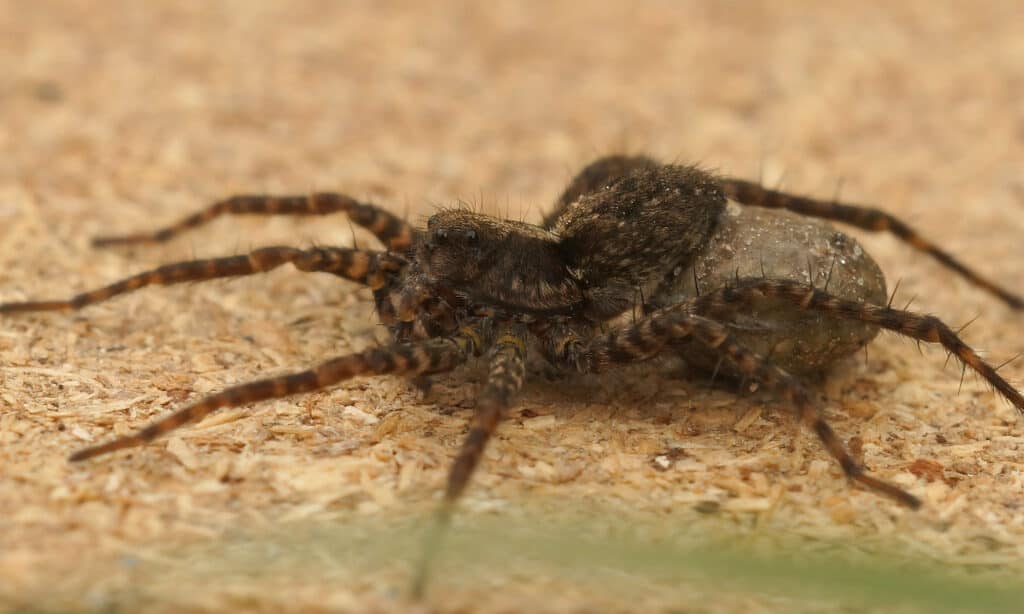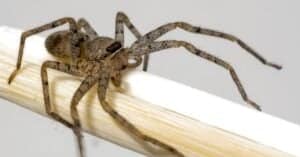Wolf spiders are among the most common arachnids spotted in urban areas. Considering that there are almost 3,000 wolf spider species and that they’re distributed worldwide, this isn’t a surprise! So, how worried should you be if you spot one? Will it jump on you? Will it bite? Will it bite your dog or cat if you have any? Keep reading to learn more about a wolf spider’s behavior!
What Are Wolf Spiders?

Wolf spiders are medium-sized arachnids measuring 0.4-1.38 inches in body length.
©iStock.com/Henrik_L
Wolf spiders are hairy arachnids that form the Lycosidae family. They can be found almost everywhere! Some wolf spiders live in burrows, while others prefer moving from one home to another. These are called “wanderers.” If you’ve spotted a wolf spider in or around your home, it most probably was a wanderer looking for food or shelter.
Wolf spiders are medium-sized arachnids measuring 0.4-1.38 inches in body length. They have hairy, predominantly brown bodies. Some species may have distinctive color patterns, which include light brown, dark brown, and black. They can be found in dense grasses, woodpiles, or tall shrubs in urban areas.
Lycosidae spiders are agile hunters that do not make webs to catch prey. They’ll likely chase the prey and pounce on it. Other species prefer waiting for prey and ambushing it. They have excellent eyesight, the ability to sense vibrations, and long legs that help them achieve speeds of up to 1.3 miles per hour. All these unique characteristics help them hunt effectively and escape predators!
Do Wolf Spiders Bite?
Wolf spiders aren’t considered aggressive. On the contrary, they’re shy arachnids that would rather run away than attack you. They only bite humans if they somehow feel threatened. If you try to squish it and miss it, the wolf spider will most probably bite you. If you try to touch it, the wolf spider will probably bite you. However, if you see it and just let it be, the wolf spider will move on with its “routine” and won’t even pay attention to you.
Wolf Spider Bite Symptoms

Most wolf spider bites are harmless to people because the toxins in their venom aren’t strong enough to cause serious health issues.
©Will E. Davis/Shutterstock.com
Most wolf spider bites are harmless to people because the toxins in their venom aren’t strong enough to cause serious health issues. The wound will be painful, swollen, and itchy if a wolf spider bites you. The pain should disappear within minutes, while the swelling and the itching may last a few days. The skin should slowly heal.
In rare cases, people develop additional symptoms which may indicate that the bite caused a secondary infection or a serious allergic reaction. So, monitoring your overall health a few days after the bite is extremely important.
If symptoms do not alleviate and any of the ones listed below appear, you should get immediate medical care.
Here are the signs your body will “send” if the wolf spider bite requires treatment:
- Headaches or dizziness
- Cramps and tight muscles around the bite
- Excessive sweating
- Fever
- Weakness
- Uncontrollable shaking
- A rash spreading outward from the bite site
- Nausea
- Vomiting
- Trouble breathing
- Swelling on the face, especially around the mouth
A study that analyzed 515 victims of wolf spider bites revealed that 79% of the bites were either on the foot or the hand, and the most common symptom was mild pain. Antivenom treatment was used only in three cases. Moreover, scientists discovered no local necrosis, indicating that their venom doesn’t harm skin tissues and muscles.
Wolf Spider Bite Treatment
If you see a wolf spider bite you, wash the bite site immediately to disinfect the area. To reduce swelling and inflammation, place a cold compress on the wound.
However, a wolf spider can sometimes bite you, and you won’t even notice it. So, if you see a swollen wound with two marks, it might have come from a wolf spider. If you aren’t sure what bit you, calling your doctor is mandatory to avoid other possible adverse reactions.
If the bite is too painful, your doctor can prescribe anti-inflammatory treatment and antihistamines to avoid any potential allergic reactions. You should also get a tetanus vaccination booster.
The treatment will be more complex if more serious symptoms develop. Your doctor may prescribe antibiotics if infections are suspected. In some rare cases, surgery might be needed if the wound is deep and causes a severe infection that cannot be treated with antibiotics.
What Should You Do if You See a Wolf Spider?
First of all, keep calm! It won’t bite you unless you panic and immediately try to squish it. Remember that you may miss it, and the spider will certainly attack you! If you find it in your house, it’s best to let the spider leave – maybe it got there by mistake and was trying to understand how to return to its natural habitat! Try following it to see if it has a hiding place or if it exits the house. Check the basement, the garage, and other hiding places to see if you’re dealing with an infestation. If you’re unsure how to handle the problem, you can always seek professional help from pest control teams.
Will a Wolf Spider Bite You in Your Sleep?
Wolf spiders may bite you in your sleep only if they accidentally get on your bed, where you can unconsciously hurt them. To avoid these situations, do not let your blankets touch the floor, as wolf spiders may climb them and get on your bed. You can also place sticky spider traps around your room to prevent spiders from entering.
Are Wolf Spiders Poisonous to Pets?

Wolf spider bites may be poisonous to smaller pets.
©HWall/Shutterstock.com
Wolf spider bites may be poisonous to smaller pets. While their venom will usually not harm humans, small dogs and cats may develop some reactions. If you notice that your pet keeps raising its paw or insistently scratches or licks an area on its skin, you should check it for any wounds. Since pets are curious creatures willing to explore everything around them, they may get dangerously close to a wolf spider, which, in turn, may bite the pets on their noses, leaving them red and swollen.
If you suspect a wolf spider has bitten your dog or cat, we recommend asking your veterinarian for recommendations.
Up Next:
- Wolf Spider Size: How Big Do Wolf Spiders Get?
- Are Wolf Spiders Poisonous or Dangerous?
- Do Wolf Spiders Make Good Pets?
The photo featured at the top of this post is © Cathy Keifer/Shutterstock.com
Sources
- WebMD, Available here: https://www.webmd.com/a-to-z-guides/what-you-need-to-know-about-a-wolf-spider-bite
- Healthline, Available here: https://www.healthline.com/health/wolf-spider-bite#treatment
- Terminix, Available here: https://www.terminix.com/blog/education/does-a-wolf-spider-bite/
Thank you for reading! Have some feedback for us? Contact the AZ Animals editorial team.






